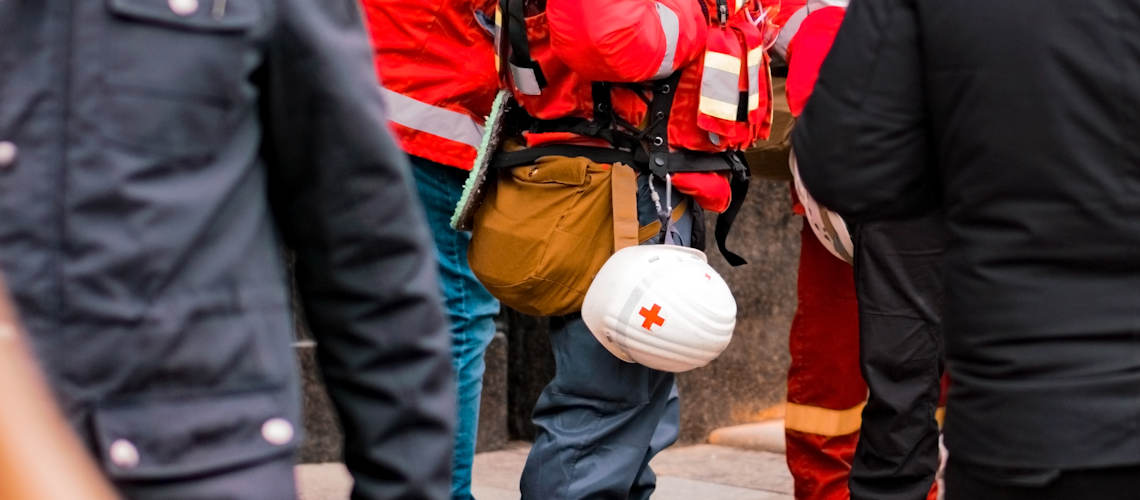Combining medical and humanitarian expertise for global health research
Experts in the Faculty of Biology, Medicine and Health are working with the University's world-leading Humanitarian and Conflict Response Institute (HCRI) on projects to research and help promote global health.

Founded in 2008 as an interdisciplinary research institute, the HCRI is led by Professor Larissa Fast and has among its founders former Médecins sans Frontièrs president Dr Rony Brauman. An interdisciplinary research institute based in the Faculty of Humanities, its researchers and teaching staff include historians, political scientists, anthropologists, geographers and emergency doctors.
Its worldwide remit and collaboration with multiple international humanitarian medical organisations (including the World Health Organisation, International Committee of the Red Cross and Doctors Without Borders) means it is well-placed to explore various facets of global health.
This work has been taking place through research projects in areas ranging from attacks on healthcare in armed conflict to the history of humanitarian medicine.
Examples of HCRI's work in global health include the following projects.
Researching the Impact of Attacks on Healthcare (RIAH)
RIAH is a multi-institution and interdisciplinary research programme to improve our understanding of the immediate, long-term, and wider impacts of attacks on healthcare on populations in contexts that have experienced armed conflict. It is funded by the UK government.
Attacks against healthcare in armed conflict, including violence, access constraints and insecurity, represent a major threat to health. In May 2016, the UN Security Council unanimously adopted Resolution 2286 demanding an end to impunity for those responsible for attacks on healthcare, and calling for respect for international law on the part of all warring parties. Gathering evidence about the attacks themselves has been and continues to be crucial in raising awareness of these issues.
The impact of attacks against healthcare in armed conflict is an intractable and priority knowledge gap despite multiple initiatives that have improved data collection about these attacks. Better understanding could help promote the resilience of health programmes, enable more effective mitigation measures, inform accountability mechanisms, and advance advocacy efforts.
Learn more on the RIAH website.
Global Emergency Care Collaborative (GECCo)
The Global Emergency Care Collaborative (GECCo) is a multi-disciplinary collaboration of professionals involved in emergency care with a shared interest in global health.
Their aim is to facilitate a dual interest in global health and emergency care by working with, and alongside, like-minded organisations and individuals by creating a platform to connect with them. They advocate for sustainable and responsible engagement in global health, underpinned by values of diversity, equity, and inclusivity.
Within emergency care, they aim to represent opportunities to positively impact global health through research, education, policy, career opportunities, clinical practice, and systems development.
As a collaborative, their objective is to continually listen, reflect and evolve to meet the needs of those who wish to pursue an interest in both emergency care and global health.
Learn more on the GECCo website.
Multilink Consortium
The Multilink Consortium is a UK National Institute for Health Research (NIHR)-funded global health programme administered through Liverpool School of Tropical Medicine (LSTM) with five partner organisations, including The University of Manchester.
It is being conducted through collaborative partnerships in Malawi and Tanzania and seeks to design and test a system that identifies patients suffering from multiple chronic diseases (multimorbidity) when they seek emergency care in sub-Saharan African hospitals.
The overall aim is to improve early disease treatment, and ensure better follow-up (prevent complications, disability, and hospital readmission), thus improving health-related quality of life and survival rates.
Led by Multilink co-investigator Professor Paul Dark, The University of Manchester, through HCRI, is providing project expertise and PhD co-supervision in rapid diagnosis in emergency care, and advising on evidence and policy for resilient health systems.
Learn more about the Multilink Consortium.
Developing Humanitarian Medicine
Professor Bertrand Taithe is leading a group of researchers based at HCRI on a new research project on the history of humanitarian medicine as a set of emergency interventions.
Humanitarian medicine centres on the rapid deployment of field hospitals and emergency health kits to crisis zones. Through archival and oral history research, this project historicises the standardisation and logistical revolutions that produced these norms since the 1970s.
Exploring internal organisational debates over cost, practicality and patient care, the project team interrogate the distinctive goals (and limits) of humanitarian medicine.
Learn more about the Developing Humanitarian Medicine project.
Find out more about the Institute's work on the HCRI website.
